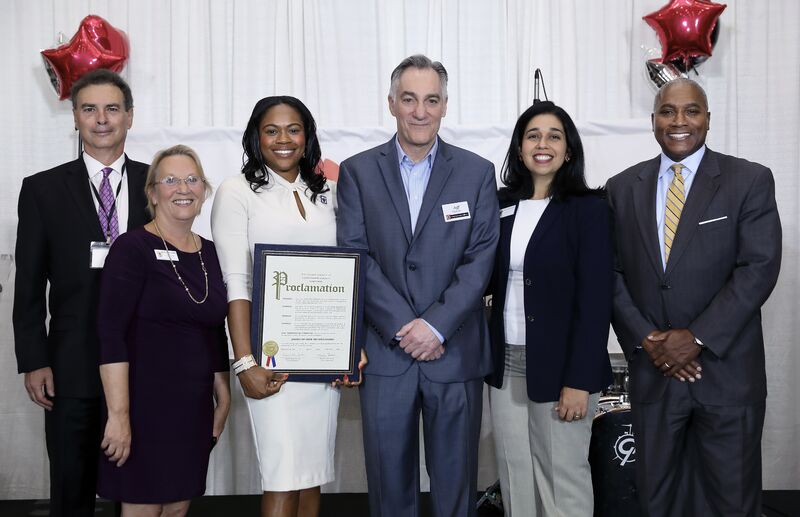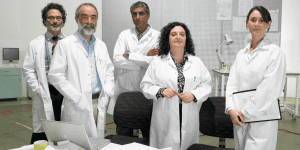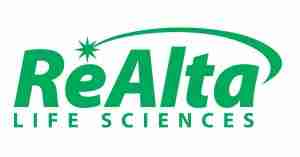
American Gene Technologies Celebrates Phase I Success of Experimental HIV Cell Therapy
By Alex Keown
June 13, 2023
American Gene Technologies (AGT) is one step closer to making history with a potential functional cure for HIV and the Rockville-based company is celebrating. The company hosted a reception on June 9 where the promise of its experimental HIV therapy and the future of the company was on full display.
Over the past several years, cell and gene therapy companies, such as Kite Therapeutics and its CAR-T therapy Yescarta, or Spark Therapeutics and its gene therapy Luxturna, have demonstrated the impact these treatments can deliver to patients. Some gene therapies in particular, have shown that a functional cure, where patients no longer show symptoms of the disease, are possible. AGT, which won a BioBuzz award for its The Cure Chronicles video series, believes its cell therapy candidate AGT103-T has the potential to deliver a functional cure to HIV patients.
AGT’s Gag-specific AGT103-T is a genetically modified cell product made from an individual’s own cells and administered to patients with an ex vivo lentiviral vector-based gene therapy. The cells are collected through a process known as leukapheresis, modified outside the body, and then re-administered into the patient. The therapy is developed over an 11 – day process to increase the number of HIV-specific T-cells resistant to HIV in order to better fight the virus.
Data from a Phase I trial assessing AGT’s lead HIV genetically modified cell product AGT103-T demonstrated a highly impressive safety signal, as well as significant therapeutic promise. The modified cells administered into patients have shown enhanced RNA interference capabilities against HIV. They also lack the CCR5 co-receptor that is necessary for the HIV infection to enter helper T cells. Trial data revealed that 100% of participants showed active immune responses to HIV after participants ceased taking their antiretroviral therapy. The data showed that several of the participants achieved significant viral suppression.
On the safety front, AGT’s HIV therapy posted results that is almost unheard of. There were zero serious adverse events among trial participants at the low and high doses. Also, there was no rejection of the cells that continued to be detected in patients, even without exposure to the virus, the company revealed. Despite the relatively long time between the infusion of the HIV cell therapy and the time the antiretroviral treatments were halted, AGT still measured impressive viral and immunological data in participants.
“We took people whose viral levels were out of control and we’ve brought them down,” AGT Founder and Chief Executive Officer Jeff Galvin told BioBuzz. “These immune responses are highly positive.”
AGT scientists continue to analyze the data to more fully understand the mechanisms underlying these findings. When they do, the research team is planning to publish an article in a peer-reviewed scientific journal. The Phase I data about this first-in-human study was published in November 2022 in Frontiers in Medicine, a peer-reviewed scientific journal focused on medical advancement. Galvin said they believe the data, and the potential of AGT103-T, is something that will draw heavy interest from the scientific community.
Galvin, who won Life Sciences Voice Top Industry Leaders Award earlier this year, noted that the Phase I data demonstrates that AGT’s platform can deliver a safe and effective therapy. If AGT103-T continues to provide similar or better results in additional clinical trials, Galvin said he is optimistic the platform can be turned toward other disease indications.
Beyond HIV, AGT is also developing potential cell therapies for cancer, as well as Phenylketonuria (PKU), an autosomal recessive disorder. Assets for these indications are currently preclinical. The positive data from the HIV program though shines a light on the capabilities of AGT’s platform in these indications. The future of these programs will likely be disclosed during the June 9 celebration.
“This is the first proof of concept for the platform. If it’s what we believe it to be, everybody on earth could benefit from our mission. This platform is the way to skate to where the puck is going. If this drug works, you could be optimistic about AGT curing cancer,” he said.
A Phase II trial for AGT103-T could begin in the first quarter of 2024 following planned discussions with the FDA. If that deadline is met, Galvin said first data from that study could be available in early 2025. Depending on the strength of that data, AGT’s road to potential commercialization of AGT103-T will be more defined.
A functional cure for HIV would be life-altering for current patients. Despite all of the advances made in HIV treatment over the past 40 years, HIV patients continue to bear a heavy burden. Not only must they stick to a strict treatment regimen, HIV patients must be cautious about potential side effects from the antiretroviral medications. Patients taking antiretroviral drugs can potentially deal with liver and kidney disease. Antiretroviral therapy is also related to elevated cholesterol levels. Beyond those physical issues, HIV patients also face a social and psychological stigma, Galvin noted.
“We want to be able to provide a one and done cell therapy that renders them immune to HIV, where they can suppress their own virus so they are no longer contagious,” he said.
In addition to AGT103-T, AGT also has additional experimental HIV therapies in development. Galvin said these later edition therapeutics are expected to be an improvement over the current lead asset.
“We are in business to put HIV in the rear view mirror for everyone,” Galvin said.








